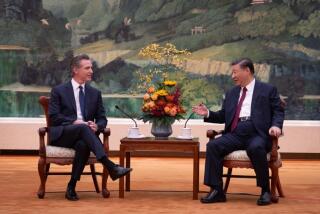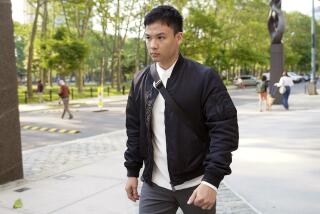Shanghai Mayor Tours U.S., Seeks to Revive Goodwill : China: Zhu is a rising star who could be a future Gorbachev. But he apparently sees no need now for Soviet-style restructuring.
- Share via
WASHINGTON — China’s most urbane and polished leader, the man some Westerners hope may become a future Chinese version of Mikhail S. Gorbachev, is barnstorming the United States, seeking to revive American goodwill and business interest in his beleaguered country.
Shanghai Mayor Zhu Rongji, the top politician in China’s largest city and one of the rising stars of the Chinese Communist Party, is the highest-ranking official to visit the United States since his government called in troops to crush pro-democracy demonstrations last year.
Zhu stopped in New York City and Washington this week and will visit Los Angeles and San Francisco later this month. He is part of a delegation of six Chinese mayors invited to the United States by the National Committee on U.S.-China Relations.
At each stop, Zhu pleads for American forbearance and understanding of the turmoil in China last year and of the differences between the two countries’ political systems.
“You have your system of democracy, and we have our system of democracy,” he said at a press conference in Washington. “But that does not mean we have nothing in common.”
(The Chinese Communist Party refers to China’s political system as a “socialist democracy,” which it readily admits is different than what it calls Western-style democracy. China’s constitution requires obedience to the leadership of the Communist Party and “the dictatorship of the proletariat.”)
In Washington, Zhu and the other five mayors got a warm welcome from the Bush Administration this week. They were greeted at the White House by National Security Adviser Brent Scowcroft and at the State Department by Deputy Secretary of State Lawrence S. Eagleburger.
A White House spokesman said the sessions did not violate the Administration policy against high-level exchanges between U.S. and Chinese leaders, because “mayors are not high-level officials.” Scowcroft and Eagleburger traveled twice to Beijing last year to meet with Chinese leader Deng Xiaoping and other top officials.
U.S. officials clearly view Zhu as a possible future leader of China. One Administration analyst said that he believes Zhu will be moved to Beijing in a top leadership post this fall.
Zhu, 61, probably has had more extensive exposure to the thinking of Western economists and business leaders than any other senior Chinese leader, with the possible exception of former Party Secretary Zhao Ziyang, who is now under house arrest. Before becoming mayor of Shanghai in 1988, Zhu was in charge of Chinese efforts to attract Western investment.
Although thousands of democracy demonstrators blocked the streets of Shanghai for several days in June, 1989, Zhu managed to defuse the crisis without imposing martial law on the city and without the bloody violence suffered in Beijing.
Zhu’s name crops up when Western analysts of China try to imagine which future Chinese Communist Party leader might succeed in taking power and instigating fundamental political changes, in the fashion of Gorbachev.
There is no sign at the moment, however, that Zhu sees the need for Soviet-style perestroika, or political restructuring, in China.
Asked whether he believes that there should be any restrictions on the authority of the Communist Party, he told reporters that the party’s efforts are aimed at improving government policies and the legal system.
“I see no reason to put restrictions on that,” he said.
As for congressional concerns about human rights violations in China, Zhu declared, “It is we ourselves who are most concerned about our own human rights.” The mayor said that the 1989 demonstrations in Shanghai prevented residents from getting food, forced women to walk long distances to work and blocked the transportation of bodies to funeral parlors.
At his Washington press conference, Zhu said that fewer than 10 people remain in detention in Shanghai as a result of those demonstrations. A few hours earlier, however, the State Department had told Congress that about 80 of the 1989 protesters are being detained in Shanghai.
Zhu acknowledges that he is concerned about flagging American business interest in China, once viewed as a potentially lucrative future market. Previously, the mayor said, the United States accounted for about a third of all foreign investment in Shanghai. This year, it has dropped to only a quarter of the total.
“We hope that this year, the American investment will increase again,” he said.
Zhu made one gibe at the new Western fascination with Eastern Europe.
“We’ve had 10 years of experience in dealing with foreign investors,” Zhu said. “. . . As to Eastern Europe, I think it may be necessary for them to collect some experience.”
While in Southern California on July 22 and 23, the mayors will visit the Port of Los Angeles, Disneyland, the RAND Corp., McDonnell-Douglas Corp., and the Los Angeles-Guangzhou Sister City Assn. They also will stop by City Hall to talk with Mayor Tom Bradley.
More to Read
Sign up for Essential California
The most important California stories and recommendations in your inbox every morning.
You may occasionally receive promotional content from the Los Angeles Times.












